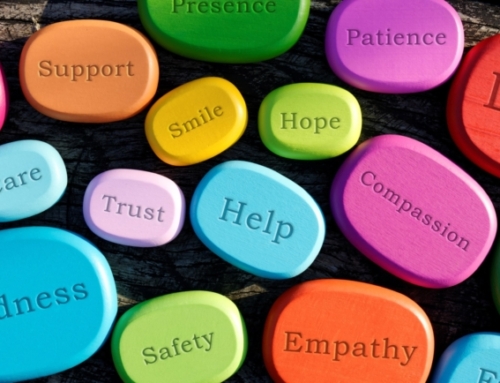How is it possible to enjoy anything and everything? Answer: by hearing and experiencing the word ‘enjoy’ as an active rather than a passive verb.
Consider other words with the prefix “en-“:
- Enliven means to add life to something, like a party
- Enrich means to bring some form of resource to something
- Enlarge is to make something larger than it was
- Engender means to cause or give rise to a certain feeling or condition
What do all these uses of ‘en-‘ have in common? In each case, an active verb is formed and indicates an activity that is performed. Someone does something, making it, causing it, adding to it, or imbuing it with something. And it requires a someone to do this something.
Thus, to enjoy something means that, in each case, some agentic activity is undertaken, and it is you who can be that adder of joy.
Commonly, though, we often hear ‘to enjoy,’ ‘enjoyed,’ ‘enjoyable,’ passively, that is, we hear it as entering a situation that we find to be pleasant, comfortable, gratifying, pleasurable, etc, and then judging it as enjoyable or not. The order of events is this: we find ourselves in a situation, not necessarily as an active participant, and then we respond to our experience of it. We may judge it appetitive or aversive and apply the word enjoyable to the first type of situation.
The word ‘enjoy’ comes from the Old French enjoir, meaning ‘to give joy,’ which is formed from the prefix ‘en-‘ (to make) and the Old French word joir (to delight in). This, in turn, comes from the Latin word gaudere, meaning ‘to rejoice’. So, the original meaning of ‘to make or give joy’ eventually came to mean ‘to take pleasure.’ And this is how ‘to enjoy’ became diluted and dulled, misunderstood and misused. Its verbal agency was erased; its undertaking turned into an undergoing.
This happens to all good words over time: that which originally shines with evocation and deep meaning becomes a commonplace word for a shallow experience. So, let us try to recapture the true and radiant meaning of ‘to enjoy.’
If we instead choose to enter into all occasions with the stance of adding joy to it, we would then both 1) take an active role in making the joy happen and 2) affect not only our own experience of it but that of every other participant. After all, when we add joy to a situation, it potentially changes it for everyone present.
But you may respond, “Some situations are so toxic or painful or hopeless that they would be impossible to enjoy. To think I could enjoy it would just be trying to fool myself.”
I agree that some situations are indeed so dire that even the most skilled ‘joy-adding’ practitioner may be stymied or overwhelmed by certain situations. What then?
First, we can expand our stance of enjoying (adding joy to) a situation by taking on the belief that we can gain from or add something to any situation, no matter how dire. Take, for example, the Navy SEAL concept of ‘full benefit.’ Full benefit is a moniker applied to the most horrendous situation a special operator can confront; not only is this likely a highly dangerous situation, but everything that can go wrong in it does go wrong. The stance of the special operators is that it is only through extreme circumstances that an operator grows their knowledge and skill.
So, even when we cannot mount a goodwill effort at enjoying a situation, we can still hold our wits about us by remembering that – since the situation we are in or facing is unavoidable – we might as well learn and emerge stronger from it, if we are to emerge at all.
Second, we can expand our fortitude in engendering joy to encompass the most dire circumstances. There are many stories of people who faced their looming ends with grace and courage and, through their stories being passed down through the generations, have served as models to us all. Perhaps it is within reason to say that Socrates enjoyed drinking the hemlock that killed him. After all, he lived out his values through the most extreme situation a human can face. He became the person he was all along, but most fully.
Also, I’m reminded of the dying words of one of my favorite poets, Gerard Manley Hopkins, who died with the words, “I am so happy, I am so happy” on his lips.
Yours in enjoying life,
Dr. Jack
“The joy that isn’t shared dies young.” – Anne Sexton
“Joy is the happiness of love – love aware of its own inner happiness. Pleasure comes from without, and joy comes from within, and it is, therefore, within reach of everyone in the world.” – Fulton J. Sheen
“Participate joyfully in the sorrows of the world. We cannot cure the world of sorrows, but we can choose to live in joy. The warrior’s approach is to say ‘yes’ to life: ‘yea’ to it all.” – Joseph Campbell
“Joy is the holy fire that keeps our purpose warm and our intelligence aglow.” – Helen Keller







Leave A Comment